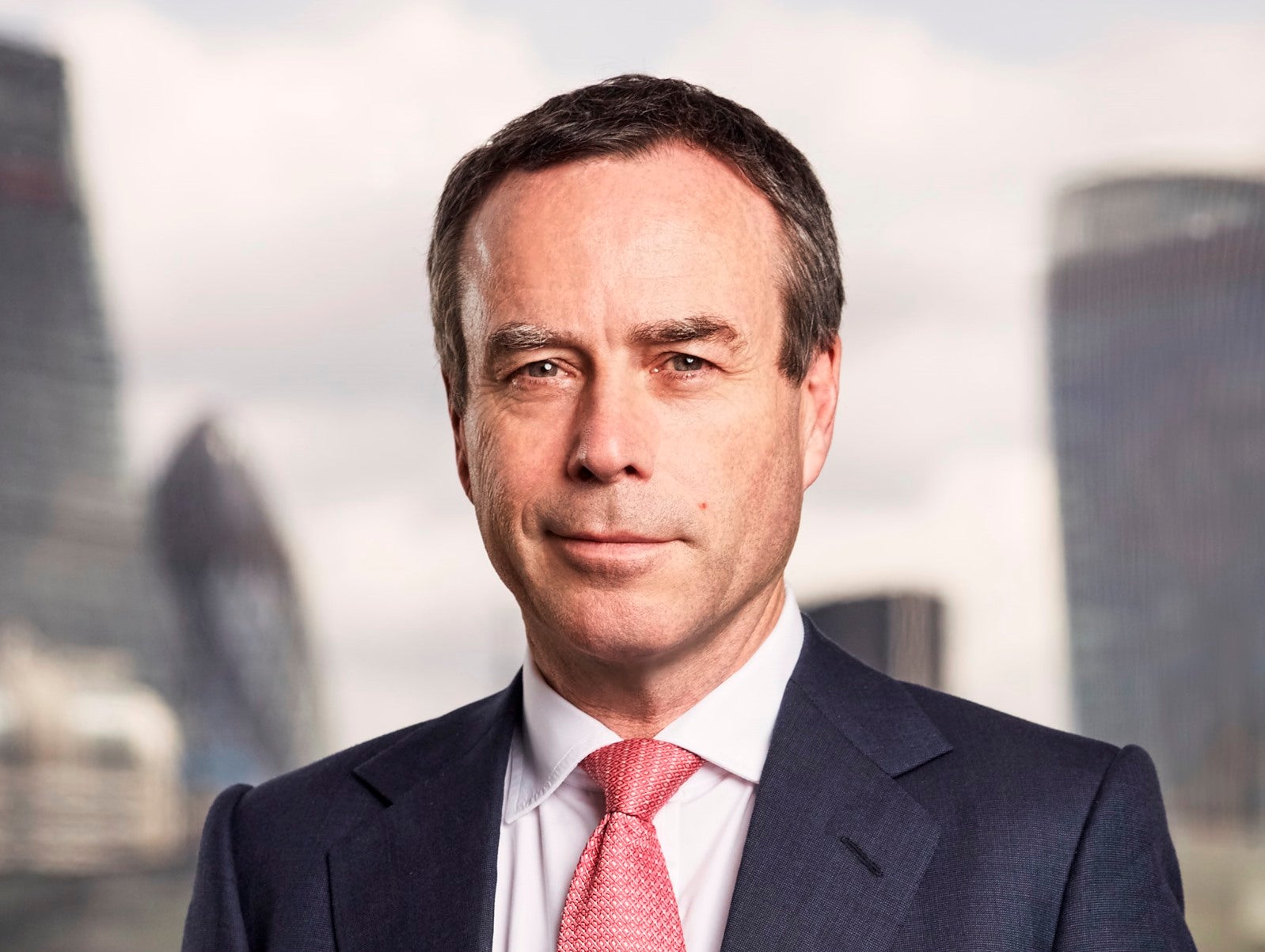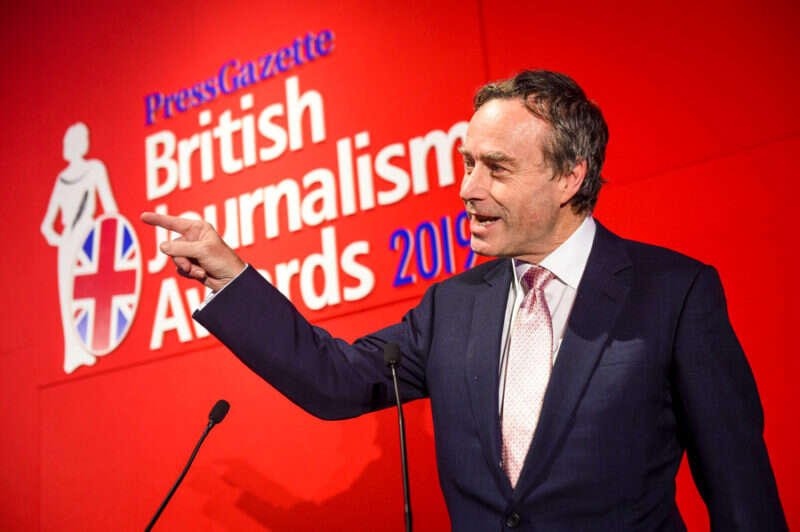
The Financial Times “reinvented the business model” for newspapers by charging for online content more than a decade ago and is now seeing the results, according to outgoing editor Lionel Barber.
Barber spoke to Press Gazette after picking up the award for News Provider of the Year at the British Journalism Awards for the second year in a row last week, which he described as “completely stunning”.
The FT surpassed 1m paying readers for the first time in April, with digital accounting for more than three-quarters of the title’s circulation.
It launched an online paywall in 2002, but in 2007 moved to a “metered” model, offering a number of free articles to registered users before prompting them to sign up, in what was then an industry first.
A number of titles followed suit, including The Times three years later, although some newsbrands still refuse to charge for online content.
‘We’ve gone for quality… and people want to read us’
“I think we reinvented the business model,” said Barber, who leaves the FT in January having spent 34 years with the title, including 14 as editor.
“We went for subscription. We charged for content. We raised prices. We said we’re going to be a subscription model… and I think you’re seeing now the results: 1m paying readers, a growing global audience.
“We were never Britain’s business newspaper, we were much more, and I think that decision to go global, go premium, charge for content, has been vindicated…
“We’ve gone for quality, we’ve gone for a premium product, and people want to read us.”
Barber said the number of FT journalists had risen under his editorship, despite his having cut the number of editorial staff by ten per cent when he took the helm in 2005 “in order to change things”.
There were 550 staff when he took over, which has now grown to 580 – “I mean, it speaks for itself,” he said of the growth.
‘We’re not a mass circulation newspaper’
The 64-year-old told Press Gazette that restructuring the business behind subscriptions had been “very difficult” and that his title had “worked incredibly hard” to make a success of it.
But he said he would “not give silver bullet lessons to anybody” on whether a subscription model is the answer for the news industry more broadly in the face of declining print circulations and advertising revenues.
The Guardian has fought against putting up a paywall on the principle of not excluding parts of society from access to news, even though it means giving away content for free online.
But Barber said he doesn’t worry about the FT being exclusive.
“We’re trying to reach people who have influence over decision making, who are aspirational,” he said. “We’re not a mass circulation newspaper.”
He said newspapers that followed the FT in putting up a paywall signalled that they understood “you’ve got to charge for content these days, otherwise you just can’t afford to do serious in-depth journalism”.
Since 2015 the FT has offered readers a four-week trial for £1 before asking them to pay from £5.35 a week for a standard digital subscription. It has only occasionally dropped its paywall, but offers free online subscriptions to students aged 16 to 19 and their teachers.
It is also the most expensive UK daily national newspaper at £2.90.
Putin interview had to be ‘mano a mano’
The FT is the first back-to-back winner in the News Provider of the Year category since the British Journalism Awards launched eight years ago.
Among the stories that impressed judges was the paper’s interview with Russian president Vladimir Putin, during which he famously proclaimed the death of liberalism.
Barber revealed the encounter with the autocrat was four years in the making and culminated in him flying to Moscow to interview Putin in person along with Moscow bureau chief Henry Foy.
“This was a process of [asking] would Mr Putin agree to an interview and then me and the FT saying: ‘No, we’re not going to do [it like] that, we’re not going to compromise.’
“It had to be a long interview on the record. You know, mano a mano kind of thing. And we didn’t agree to anything being censored. We didn’t agree to anything being off the record. We didn’t agree to anything being out of bounds – and finally he agreed to do that.”
Barber said he had met Putin once before at a public dinner, but that this was the “first serious on-the-record interview with him by a Western publication for years – nobody had actually got to him”.
The story, published in June this year, made international headlines.
Barber on Brexit
Barber said the FT had “pushed the boundaries” in 2019 and that it “took on some very difficult, powerful people to call them to account”. But one area where the paper has been criticised is on Brexit.
It was dubbed “The Daily Remainer” by Brexiteers after the 2016 EU Referendum while Barber was offered France’s highest honour in recognition of the paper’s “positive role in the European debate”
Ahead of last week’s general election, when this interview took place, the FT had all but endorsed the Liberal Democrats as it railed against a move away from the political centre ground.
Barber said the FT’s position on Brexit had been “misrepresented”. “We were very clear ahead of the referendum that we wanted a Remain result,” he said. “When it went Leave, we said we would respect the result.”
He said the paper had “never called for a second referendum”.
Barber went on: “I still think that leaving will cause short-term damage to the economy, but I think it’s absolutely important that we identify a positive route forward which can benefit the country.”
Boris Johnson’s landslide election victory on Thursday last week is seen as having sealed Britain’s fate on departing the European Union.
On the future of the news industry, Barber said he had a “positive” outlook, adding: “You’ve just got to be really very, very focused on deep original and trustworthy journalism. That’s what we’ve done [at the FT].
“Off a base of financial, business and economic news, we then built on that and we’ve done extraordinary things.”
Barber pointed to recent FT hire Janine Gibson, who won a Pulitzer Prize with the Guardian before editing Buzzfeed UK, and her work on The Corbyn Revolution story that helped the FT win the Politics Journalism prize at the British Journalism Awards this year.
He said the FT Weekend, the newspaper’s Saturday edition, is “amazingly strong” under editor Alex Russell. “The opportunities at the FT are boundless,” said Barber.
Roula Khalaf is ‘going to take it to another space’
He also said the FT was committed to print. The paper has a paid-for circulation of more than 163,000, including 30,000 bulks (ABC figures for November). Only The Guardian sells less.
But, said Barber: “We’re not going to give up on that.
“There were people 15 years ago who said it’s for trees. It ain’t for trees. We have managed to maintain a model where we are fully digital, we are engaged on mobile and we’ve got a strong print product.”
Nonetheless it is rising digital revenues that are behind surging profits at Financial Times Ltd, the UK arm of the company, which was bought by Japanese publishing giant Nikkei from Pearson in 2015.
Pre-tax profits at FT Ltd grew by three-quarters in 2018 to £8.16m, on revenues of £323.6m, according to accounts filed with Companies House.

FT editor Lionel Barber collects the prize for News Provider of the Year at the British Journalism Awards 2019. Picture: Press Gazette / The Photo Team
Barber’s walk to the podium at the British Journalism Awards on Tuesday last week was met with a standing ovation from the tables of FT staff.
At one of them was Roula Khalaf, who will take the reins from him in the New Year. She has served as Barber’s deputy editor at the FT for four years.
Barber praised his successor as an “outstanding journalist” and a “very strong, wise and fair individual”, but gave no indication of where he would like her to take the paper, telling Press Gazette: “It’s for her.”
“She’s going to take it to another space and level,” he said. “The FT’s in a really, really good place and I’m really pleased that this award [for News Provider of the Year] vindicates that.”
As for Barber himself, he said he intends to take a break and “let the inbox fill”. Calling his next chapter a “blank page”, he added: “I’ve done what I’ve done. I’ve had a wonderful career.”
Aside from taking a holiday, Barber said he may continue to write, but would not do anything that would compete with the FT. “That’s not what I do,” he said. “I’ve had 35 years. I love the FT.”
Picture: Financial Times
Email pged@pressgazette.co.uk to point out mistakes, provide story tips or send in a letter for publication on our "Letters Page" blog
